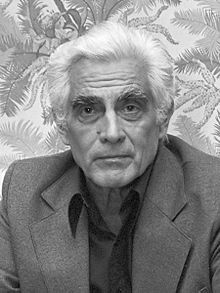Álvaro Cunhal
| Álvaro Cunhal | |
|---|---|
 |
|
| Leader of the Democratic Unitarian Coalition | |
|
In office 30 September 1987 – 5 December 1992 |
|
| Preceded by | Position established |
| Succeeded by | Carlos Carvalhas |
| Minister without Portfolio | |
|
In office 16 May 1974 – 8 August 1975 |
|
| Prime Minister |
Adelino da Palma Carlos Vasco Gonçalves |
| Preceded by | Position established |
| Succeeded by | Jorge Campinos |
| General Secretary of the Portuguese Communist Party | |
|
In office 31 March 1961 – 5 December 1992 |
|
| Preceded by | Bento Gonçalves |
| Succeeded by | Carlos Carvalhas |
| Personal details | |
| Born |
Álvaro Barreirinhas Cunhal November 10, 1913 Coimbra, Portugal |
| Died | June 13, 2005 (aged 91) Lisbon, Portugal |
| Political party | Portuguese Communist Party |
| Domestic partner | Isaura Moreira (1960–1965) |
| Children | One daughter |
| Alma mater | University of Lisbon |
Álvaro Barreirinhas Cunhal (Portuguese pronunciation: [ˈaɫvɐɾu kuˈɲaɫ]; 10 November 1913 – 13 June 2005), was a Portuguese communist revolutionary and politician. He was one of the major opponents of the dictatorial regime of Estado Novo. He served as secretary-general of the Portuguese Communist Party (PCP) from 1961 to 1992. He was one of the most pro-Soviet of all western Europe communist leaders, often supporting the Soviet Union's foreign policies, including the intervention in Czechoslovakia in 1968.
Cunhal was born in Coimbra, the third child of Avelino Henriques da Costa Cunhal (Seia, Seia, October 28, 1887 – Coimbra, Sé Nova, December 19, 1966) and wife (m. Coimbra, Sé Nova, August 22, 1908) Mercedes Simões Ferreira Barreirinhas (Coimbra, Sé Nova, May 5, 1888 – Lisbon, September 12, 1971). His father was a lawyer in Coimbra and Seia, and later on in Lisbon, and came from a family of rural bourgeoisie, related to a rich and more aristocratic family, the Cunhal Patrício. His mother was a devout Catholic who wished her son had also become one. He also studied Law at the University of Lisbon, where he joined the PCP, then an illegal organization, in 1931. The deaths of his younger sister Maria Mansueta Barrerinhas Cunhal (Coimbra – Seia, January 13, 1921) and of his older brother António José Barreirinhas Cunhal (Coimbra, 1910 – Lisbon, 1932) struck the grief of both his parents and brothers, but specially of his mother and Álvaro, of whom they had always been close. He visited the Soviet Union for the first time in 1935 to attend the Seventh World Congress of the Comintern in Moscow. He joined the Central Committee of the PCP in 1936 at the age of 24. His first arrest occurred in 1937.
...
Wikipedia
